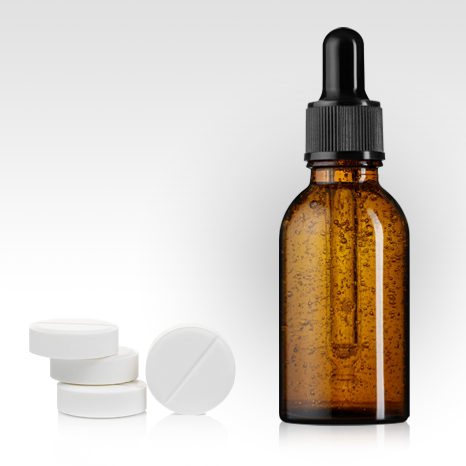 Minerals are essential for proper bodily function, and deficiencies can lead to many health problems. In today’s article, we will compare mineral supplementation in liquid form with supplementation in tablet form in terms of effectiveness, absorption, and convenience of use. Find out which option is best for you and how you can improve your health through proper supplementation.
Minerals are essential for proper bodily function, and deficiencies can lead to many health problems. In today’s article, we will compare mineral supplementation in liquid form with supplementation in tablet form in terms of effectiveness, absorption, and convenience of use. Find out which option is best for you and how you can improve your health through proper supplementation.
EFFECTIVENESS OF MINERAL SUPPLEMENTATION: LIQUID VS TABLETS
Mineral supplementation in liquid form is often considered more effective than supplementation in tablet form. The main reason is the better absorption of liquid minerals by the body. Since minerals in liquid form are already in solution, the body can absorb them more easily and quickly than minerals in solid form, such as tablets.
In the case of tablets, minerals must first be released from the tablet and then dissolved by the digestive system before they can be absorbed. These additional processing stages can lead to lower bioavailability of minerals in tablets, meaning that less of them enter the bloodstream and cells where they are needed.
MINERAL ABSORPTION: KEY TO EFFECTIVE SUPPLEMENTATION
Wchłanianie minerałów jest jednym z najważniejszych czynników wpływających na skuteczność suplementacji. Jak już wspomnieliśmy, minerały w płynie mają wyższą biodostępność i są łatwiej wchłaniane przez organizm niż minerały w tabletkach.
Warto również zauważyć, że niektóre minerały są lepiej wchłaniane w obecności innych minerałów. Na przykład, wapń jest lepiej wchłaniany w obecności magnezu. Suplementacja minerałów w płynie pozwala na łatwe łączenie różnych minerałów w odpowiednich proporcjach, co może zwiększyć ich wchłanianie i efektywność.
CONVENIENCE OF USE: LIQUID MINERALS OR TABLETS?
The convenience of supplementation is also important. Liquid minerals may be easier to dose and consume, especially for people who have difficulty swallowing tablets. Liquid minerals can be added to drinks or consumed directly, which may be more pleasant for some people. Liquid supplementation also allows for individual dosing adjustment, which can be beneficial for people with different needs and preferences.
On the other hand, tablets may be more convenient for people who travel or do not have access to water. Additionally, tablets are often easier to store because they do not require special conditions such as refrigeration
.
SUMMARY: LIQUID MINERALS OR TABLETS – WHICH OPTION IS BEST FOR YOU?
The choice between supplementing minerals in liquid form or tablets depends on many factors, such as individual needs, preferences, and convenience. Here’s a brief summary of the comparison.
- Effectiveness: Liquid minerals are usually more effective than tablets due to better absorption.
- Absorption: Liquid minerals have higher bioavailability and are more easily absorbed by the body than minerals in tablets.
- Convenience: Liquid minerals may be easier to dose and consume, but tablets may be more convenient for travel and storage.
Ultimately, the best solution is to choose a supplementation that best fits your lifestyle, needs, and preferences. You can also consult with your doctor or nutrition specialist for individual recommendations on mineral supplementation.
Bibliography:
1. Elin, R.J. (2010). Assessment of magnesium status for diagnosis and therapy. Magnesium Research, 23(4), S194-S198. doi: 10.1684/mrh.2010.0213
2. Heaney, R.P. (2008). Factors influencing the measurement of bioavailability, taking calcium as a model. The Journal of Nutrition, 138(8), 1645S-1648S. doi: 10.1093/jn/138.8.1645S
Lieberman, S., & Bruning, N. (2007). The Real Vitamin & Mineral Book (4th ed.). New York, NY: Avery
3. Moshfegh, A., Goldman, J., & Cleveland, L. (2005). What We Eat in America, NHANES 2001-2002: Usual Nutrient Intakes from Food Compared to Dietary Reference Intakes. U.S. Department of Agriculture, Agricultural Research Service
4. Natural Medicines Comprehensive Database. (2021). Natural Medicines Comprehensive Database [Online]. Retrieved from: https://naturalmedicines.therapeuticresearch.com/
Rodushkin, I., & Axelsson, M.D. (2000). Application of double focusing sector field ICP-MS for multielemental characterization of human hair and nails. Part II. A study of the inhabitants of northern Sweden. Science of The Total Environment, 262(1-2), 21-36. doi: 10.1016/s0048-9697(00)00537-3
5. Suttle, N.F. (2010). Mineral Nutrition of Livestock (4th ed.). Cambridge, MA: CABI.
Thomas, D.T., Erdman, K.A., & Burke, L.M. (2016). Position of the Academy of Nutrition and Dietetics, Dietitians of Canada, and the American College of Sports Medicine: Nutrition and Athletic Performance. Journal of the Academy of Nutrition and Dietetics, 116(3), 501-528. doi: 10.1016/j.jand.2015.12.006 U.S. National Institutes of Health, Office of Dietary Supplements. (2021). Dietary Supplement Fact Sheets [Online]. Retrieved from: https://ods.od.nih.gov/factsheets/list-all/














